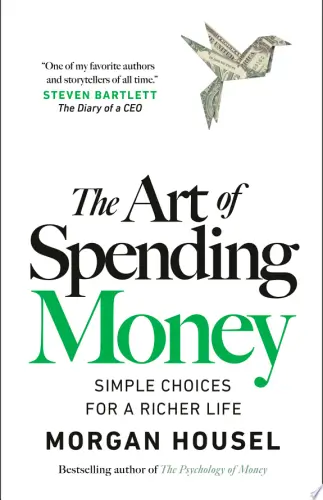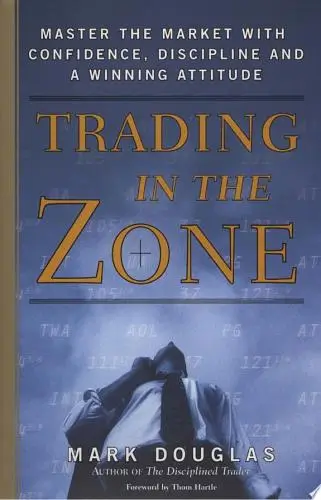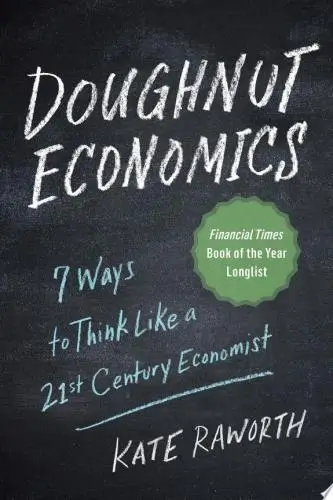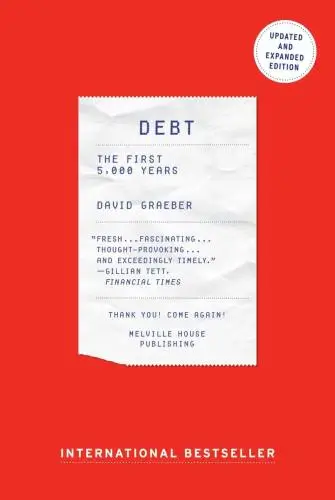The Psychology of Money
Timeless lessons on wealth, greed, and happiness
What's it about?
The Psychology of Money by Morgan Housel explores the complex relationship between money and human behavior. From the psychology behind our financial decision-making to the impact of our emotions and biases on wealth creation, Housel delves into the fascinating aspects of money management. Through engaging anecdotes and insights, he dispels common myths and offers timeless lessons on how to navigate the unpredictable world of finance. This book is a thought-provoking exploration of the psychological factors that shape our financial lives.
About the Author
Morgan Housel is an author and financial journalist known for his insightful writings on investing, behavioral finance, and personal finance. He has written for prominent publications like The Wall Street Journal and The Motley Fool. Housel has also worked as a columnist at The Motley Fool and The Collaborative Fund. His book, "The Psychology of Money: Timeless Lessons on Wealth, Greed, and Happiness," became a New York Times bestseller. With a focus on understanding the human side of finance, Housel's work provides valuable insights into the intersection of psychology and investing.
17 Key Ideas of The Psychology of Money
- No One’s Crazy
- Luck & Risk
- Never Enough
- Confounding Compounding
- Getting Wealthy vs. Staying Wealthy
- Tails, You Win
- Freedom
- Wealth is What You Don’t See
- Save Money
- Reasonable > Rational
- Surprise!
- Room for Error
- You’ll Change
- Nothing’s Free
- You & Me
- The Seduction of Pessimism
- When You’ll Believe Anything
The way we interact with money—how we save, spend, invest, and even talk about it—is deeply rooted in experiences that are as unique to us as our fingerprints. These experiences shape not only how we approach finances but also how we rationalize decisions that might seem puzzling or imprudent to others.
Generational Influence on Money Views
Imagine two people: one who came of age during an economic boom and another during a recession. Their outlooks on risk-taking and investing will likely be worlds apart. This is because their formative years left indelible marks on their financial psyches—a phenomenon known as "imprinting." It's akin to learning your first language; it happens naturally and becomes second nature.
Generational imprints can explain why some view the stock market with skepticism while others see it as a golden path to wealth. Similarly, attitudes toward debt, savings, and even governmental fiscal policies can diverge sharply based on when someone grew up.
Rationality Through Personal Lenses
We often believe that our financial choices are grounded in logic and reason—but they're more accurately described as stories we tell ourselves, narratives crafted from past chapters of our lives. These stories help us make sense of complex situations like market fluctuations or economic downturns by fitting them into familiar patterns shaped by experience.
For instance, someone who has lived through hyperinflation may prioritize liquidity over long-term investments due to their historical context—even if current conditions don't necessarily warrant such caution.
Embracing Empathy in Finance
Understanding this concept calls for empathy above all else. When faced with what seems like irrational behavior—like hoarding cash under the mattress or eschewing stocks for low-yield bonds—we must remember that these actions are rational within the framework of someone's life story.
By embracing this empathetic approach towards understanding each other's financial decisions, we pave the way for more inclusive conversations around money—one where judgment is replaced by curiosity about each other’s backgrounds.
Tactics
- Acknowledge Diverse Perspectives: Recognizing different viewpoints allows for richer discussions about finance.
- Practice Empathetic Listening: Truly hearing out someone’s reasoning behind their monetary choices fosters deeper comprehension.
- Consider Historical Contexts: Reflecting upon how various generations have been affected differently aids in making informed analyses.
- Promote Inclusive Financial Education Programs: Tailoring education initiatives to diverse experiences encourages better decision-making.
- Reflect On Personal Biases: Being aware of one’s own preconceptions helps appreciate alternative approaches to managing finances.
In conclusion, no one is crazy when it comes to money—they're just navigating through life using a map drawn from personal history. By acknowledging this fact and applying empathy liberally in our interactions regarding finances, we open doors to mutual understanding rather than erect walls built from incomprehension.
Key Examples/Data
Different Experiences with Money: People from different generations, raised by different parents, and living in different economic conditions have unique experiences with money. For instance, the person who grew up in poverty thinks about risk and reward differently than the child of a wealthy banker. Similarly, those who experienced high inflation have a different perspective compared to those who grew up with stable prices.
Impact of Personal History on Investment Decisions: Economists Ulrike Malmendier and Stefan Nagel found that people's lifetime investment decisions are heavily influenced by their experiences early in their adult life. For example, those who grew up when the stock market was strong tend to invest more in stocks later in life, while those who experienced high inflation invest less in bonds. This demonstrates how individual investors' willingness to bear risk depends on personal history rather than intelligence or education.
Impact of Birth Year on Financial Views: The year of birth significantly influences individuals' views on financial matters. For instance, individuals born in different decades have contrasting experiences with the stock market and inflation, leading to varying perspectives on these financial aspects.
Impact of Unique Experiences on Financial Decisions: The story of low-income individuals spending a significant amount on lottery tickets sheds light on how personal history and circumstances influence financial decisions. Despite seeming irrational, the decision to buy lottery tickets is justified by the tangible dream it offers to those who feel financially constrained.
Newness of Money Decisions: The concept of retirement entitlement is relatively new, with the expectation of saving and investing for retirement only gaining prominence in the last few decades. Similarly, the rapid rise in college education and the evolution of financial instruments like index funds and hedge funds have significantly impacted financial decision-making.
Quotes
- "People from different generations, raised by different parents who earned different incomes and held different values, in different parts of the world, born into different economies, experiencing different job markets with different incentives and different degrees of luck, learn very different lessons."
- "Your personal experiences with money make up maybe 0.00000001% of what’s happened in the world, but maybe 80% of how you think the world works."
- "Our findings suggest that individual investors’ willingness to bear risk depends on personal history."
- "Two groups of people, separated by chance of their birth year, go through life with a completely different view on how the stock market works."
- "Every financial decision a person makes, makes sense to them in that moment and checks the boxes they need to check."
- "We all do crazy stuff with money, because we’re all relatively new to this game and what looks crazy to you might make sense to me. But no one is crazy—we all make decisions based on our own unique experiences that seem to make sense to us in a given moment."
The Psychology of Money Summary: Common Questions
Picture this: A world where the dollar bills in our wallets hold whispered tales of human hopes, ambitions, and follies. That's the realm Morgan Housel invites us into with 'The Psychology of Money'. Rather than presenting a dry financial treatise, Housel delves into the intricate dance between our brains and our bank accounts, making the world of money both vividly personal and universally relatable.
Housel's strength lies in his narrative prowess. He has an uncanny ability to spin yarns about the financial decisions of both the common man and the magnates, revealing the subtle yet potent psychological drivers behind them. While the book is chock-full of insights, it occasionally risks oversimplifying complex financial ideas. Yet, this approach could be seen as its strength, for it makes the content more accessible to the average reader.
In the grand scheme of financial literature, 'The Psychology of Money' is a breath of fresh air. It’s not a guide to get rich quick, but an exploration into why we desire wealth and how our mindsets mold our financial destinies. Concluding my journey with Housel's work, I'd gladly stamp it with a 4.7 out of 5, primarily for the sheer volume of insights I've pocketed.
Experience Personalized Book Summaries, Today!
Discover a new way to gain knowledge, and save time.
Sign up for our 7-day trial now.
No Credit Card Needed

Similar Books

Forex Trading QuickStart Guide
Troy Noonan
The Art of Spending Money
Morgan Housel
Trading in the Zone
Mark Douglas
Doughnut Economics
Kate Raworth
A study guide for Barbara Ehrenreich's "Nickel and Dimed: On (Not) Getting By in America"
Gale, Cengage Learning
Bitcoin For Dummies
Prypto
Debt
David Graeber
The Barefoot Investor
Scott Pape
Money Has No Value
Samuel A. Chambers
Financial Peace
Dave RamseyTrending Summaries

Peak
Anders Ericsson
Never Split the Difference
Chris Voss
Smart Brevity
Jim VandeHei
The Psychology of Money
Morgan Housel
The First 90 Days
Michael D. Watkins
Atomic Habits
James Clear
Thinking, Fast and Slow
Daniel Kahneman
The Body Keeps the Score
Bessel van der Kolk M.D.
The Power of Regret
Daniel H. Pink
The Compound Effect
Darren HardyNew Books

Forex Trading QuickStart Guide
Troy Noonan
Comprehensive Casebook of Cognitive Therapy
Frank M. Dattilio
The White Night of St. Petersburg
Michel (Prince of Greece)
Demystifying Climate Models
Andrew Gettelman
The Hobbit
J.R.R. Tolkien
The Decision Book
Mikael Krogerus
The Decision Book: 50 Models for Strategic Thinking
Mikael Krogerus
Fichte
Johann Gottlieb Fichte
Do No Harm
Henry Marsh
